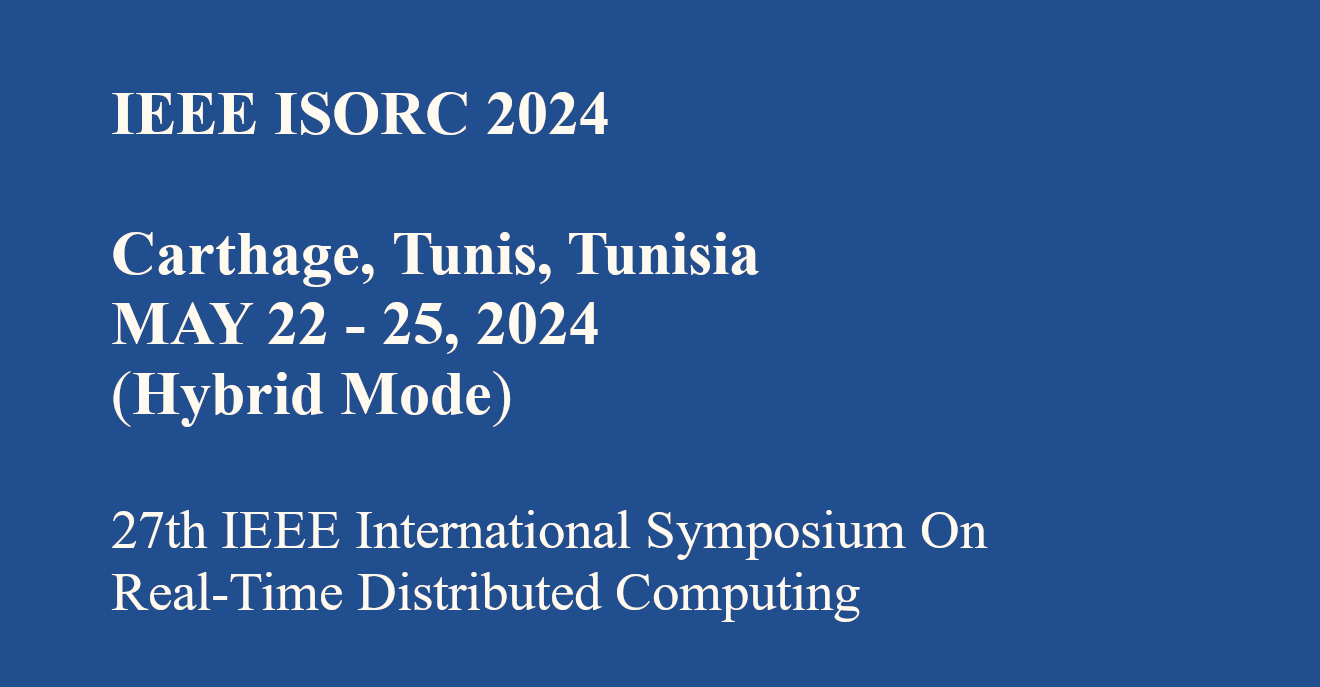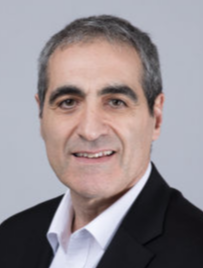






















IEEE ISORC was founded in 1998 (with its first meeting in Kyoto, Japan) to address research into the application of real-time object-oriented distributed technology. Since then, ISORC has continually evolved to meet the latest challenges faced by researchers and practitioners in the real-time domain, with an emphasis on object-, component- and service-oriented systems and solutions.
ISORC is a single-track conference, with a lively community. We have hosted a number of associated workshops, doctoral symposium, dissertation digest and are proud of our spirit of openness. We seek to encourage diverse views and new approaches to all Real-Time Issues and Challenges for novel applications and systems in RT computing issues.
Papers are to be submitted through the HotCRP system.
For our 27th symposium, we are meeting in Tunisia, in the city of Carthage, Tunis, from May 22 - 25, 2024.
For more information on IEEE ISORC 2024 and its location, calls for papers, workshops, and events, please use the menu bar at the top of the screen of the main page. We look forward to seeing you in Tunisia in Carthage 2024!
Main Track:
Submission deadline:
Extended deadline (Firm): February 04, 2023 (AoE)
Acceptance notification:
Camera-ready papers:
Conference: May 22 - 25, 2024
Registration:
Tweets by isorc2023
| Speaker: Prof. Serge Fdida, Sorbonne University, France. |
|---|
| Title: Future Network reproducibility |
| Abstract |
|
The scientific community engaged in the research of future generation networks and systems is lacking advanced and sustainable tools to evidence their research, accelerate the discovery process by sharing their data as well as support reproducibility. This first implies that academic research is often lagging behind large industry. Second, it becomes almost impossible to handle the pace of academic scientific production, largely data-driven thanks to the fast application of AI/ML, but that is hard to validate. SLICES is the first initiative structured as a scientific instrument, under the umbrella of the European ESFRI framework, sustainable, aiming to cover the full research large cycle. This talk will introduce the instrument, its community, academy and roadmap. It will emphasize its openness and potential for cooperation. |
| Bio: Prof. Serge Fdida |
|
|
| Speaker: Prof. Jean-Luc Gaudiot, University of California, Irvine, USA. |
|---|
| Title: Hardware Security |
| Abstract |
|
In the past decades, computer design has prioritized performance, cost reduction, and energy efficiency over security. Meanwhile, malicious attacks have surged with the ever- increasing number of Internet-connected devices. Traditional antivirus software struggles to combat these attacks, particularly those exploiting hardware vulnerabilities. We introduce an additional layer of malware detection at the hardware level, monitoring semantic and sub-semantic behaviors to enhance system security. We present a real- time malware detection system monitoring microarchitectural features to detect anomalies indicative of attacks like Rowhammer and Spectre. Our experiments demonstrate scalability and promising detection accuracy. Future research aims to extend detection to GPU and other hardware vulnerabilities, emphasizing proactive, multi-layered defense mechanisms to counter evolving malware threats. |
| Bio: Prof. Jean-Luc Gaudiot |
|
|
We acknowledge support from the following.

|

|

 Serge Fdida is a Professor with Sorbonne Université since 1995. His
research interests are related to the future internet technology and
architecture. He has been leading many research projects in Europe,
notably pioneering the activity on federated Internet testbeds. He
established PlanetLab Europe in 2007 and the OneLab and FIT
facilities. He was one of the initiators of the ACM Conext conference,
general chair of ACM Mobicom 2015, IEEE Infocom 2019 and in 2021
and started the NetworkingChannel online program. Serge Fdida has
also developed a strong experience related to innovation and industry transfer, - he was the
co-founder of the Qosmos and Hopcast companies, - one of the active contributors to the
creation of the Cap Digital cluster in Paris and President of EIT Health France.
He is currently coordinating SLICES, the first large-scale scientific
instrument in Digital Sciences, supported by the EU ESFRI framework.
Serge Fdida received his PhD from Université Pierre & Marie
Curie (UPMC), Paris in 1984. He received his Habilitation in 1989. Assistant Professor UPMC
(1983-1987). Associate Professor UPMC (1988-1991). Professor Université Paris Descartes
(1991-1995). Sabbatical at IBM Raleigh in 1995. Professor Sorbonne Université. Adviser ITC
Department CNRS (2000-2005). Vice-President European affairs of UPMC (2014-2018). VP
International Development of Sorbonne Université (2018-2021).
Serge Fdida is a Professor with Sorbonne Université since 1995. His
research interests are related to the future internet technology and
architecture. He has been leading many research projects in Europe,
notably pioneering the activity on federated Internet testbeds. He
established PlanetLab Europe in 2007 and the OneLab and FIT
facilities. He was one of the initiators of the ACM Conext conference,
general chair of ACM Mobicom 2015, IEEE Infocom 2019 and in 2021
and started the NetworkingChannel online program. Serge Fdida has
also developed a strong experience related to innovation and industry transfer, - he was the
co-founder of the Qosmos and Hopcast companies, - one of the active contributors to the
creation of the Cap Digital cluster in Paris and President of EIT Health France.
He is currently coordinating SLICES, the first large-scale scientific
instrument in Digital Sciences, supported by the EU ESFRI framework.
Serge Fdida received his PhD from Université Pierre & Marie
Curie (UPMC), Paris in 1984. He received his Habilitation in 1989. Assistant Professor UPMC
(1983-1987). Associate Professor UPMC (1988-1991). Professor Université Paris Descartes
(1991-1995). Sabbatical at IBM Raleigh in 1995. Professor Sorbonne Université. Adviser ITC
Department CNRS (2000-2005). Vice-President European affairs of UPMC (2014-2018). VP
International Development of Sorbonne Université (2018-2021).
 Jean-Luc Gaudiot is Distinguished Professor of Electrical Engineering and Computer Science at the
University of California, Irvine, where he was Department Chair for six years. Prior, he was Professor
at the University of Southern California. He received a PhD in Computer Science from UCLA in 1982.
He is a Fellow of IEEE and AAAS, an IFIP Silver Core Member, and a Professional Member of Eta Kappa Nu.
He was 2017 IEEE Computer Society President, Editor-in-Chief and Editorial Board member of
several journals as well as a leader of many conferences. He has been a major participant in
technology forecasting (Predictions 2024 and 2023 International Roadmap for Devices and Systems).
His many contributions to the architecture of multiprocessors, the design of autonomous
driving systems, hardware security, etc., have been published in over 300 articles and books. His
research has been sponsored by NSF, DoE, and DARPA, as well as industrial organizations.
Jean-Luc Gaudiot is Distinguished Professor of Electrical Engineering and Computer Science at the
University of California, Irvine, where he was Department Chair for six years. Prior, he was Professor
at the University of Southern California. He received a PhD in Computer Science from UCLA in 1982.
He is a Fellow of IEEE and AAAS, an IFIP Silver Core Member, and a Professional Member of Eta Kappa Nu.
He was 2017 IEEE Computer Society President, Editor-in-Chief and Editorial Board member of
several journals as well as a leader of many conferences. He has been a major participant in
technology forecasting (Predictions 2024 and 2023 International Roadmap for Devices and Systems).
His many contributions to the architecture of multiprocessors, the design of autonomous
driving systems, hardware security, etc., have been published in over 300 articles and books. His
research has been sponsored by NSF, DoE, and DARPA, as well as industrial organizations.